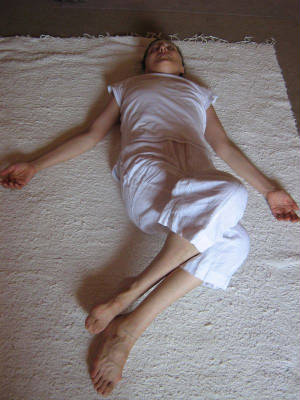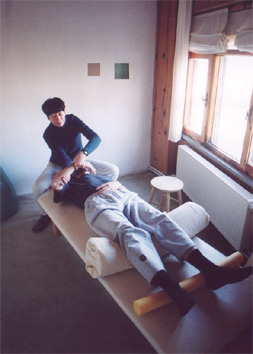|
Türkiye'de Feldenkrais Metodu |
||||
|
|
The Feldenkrais Method |
|
What does "Feldenkrais" mean? Nothing. It's the surname of Moshe Feldenkrais who developed the method. What kind of people take classes? People like you! Is it like yoga? No. The Feldenkrais Method is closest to the Alexander Technique. While the philosophy and functional focus
of the two are very similar the form the practice of each takes is is quite different. It has nothing to do with bioenergy,
physical therapy or dance either. For some people it has a meditative quality. What you will do in a class: Gentle movements which are sometimes challenging in that you will never ahve done anything like that before,
but not in that they require strength or straining. In the group lessons you will follow verbal instructions to do the movements,
listening to how you move rather than achieving a result. One-to-one lessons are hands on and more passive. Both types of
class are done fully-dressed and mostly lying down. The aim of the lessons: To re-educate your body. To teach it more comfortable and healthier ways of moving it used to know but forgot
along the way. To eliminate habits and parasitic ways of thinking which hinder your movement and your life. Learning quality,
not worrying about quantity. The Feldenkrais difference: How you might feel at the end of a lesson: Lighter, heavier, taller, more relaxed, more alive as no two people are the same everyones experience of lesson
is different, as is what each person learns from it. What people have said after lessons: "I feel so relaxed....and I thought I was relaxed when I came!" "It's like meditation" "Before the lesson I would never have believed I could do those movements" "I'd never realised that I keep tensing up my shoulder" "Being able to learn something new by being nice to myself instead of straining was a really interesting experience" "At the end of that lesson walking was effortless" Why you may want to start lessons: Where you can take classes: I live and work in a village near Selçuk (which is 45 minutes from Izmir) and I travel to Istanbul to
work for one week each month.
|
|
Do you have another 5 minutes? In a conversation after a group class one day, someone asked about whether I did lessons for myself. I said
that I got on the floor and worked with myself nearly every day and did a full lesson as often as I could. One of the participants
said: "That's because you're a Feldenkrais Practitioner". No!! No one makes me lie on the floor, and no one pays me or gives
me points. And I don't lose my certification if I don't. I simply know how much I get from it and how much I need it. I became
a Feldenkrais Practitioner because the work means so much to me. After years of searching in teaching, art and environment work I became a practitioner because I knew I'd
found a missing link, something that was obviously genuine and necessary, and meant enough to be my life's work. I spent a
lot of money and three intensive years doing my training. Thank goodness I did. As well as vastly improving my ability to
move, this work has changed my sense of myself, my self-image and how I manage my life. I am still learning and hope that I will always do so. Curiosity and the capacity of humans to always learn
are fundamental to Feldenkrais thinking. The deeper I go the more it means, the clearer its importance becomes. But that doesn't
mean it gets easier to put across to others! For some it's obvious, for others less so. I do lessons for myself because I enjoy them and feel good during and after them and I really can't imagine
what state I would be in now if I hadn't discovered Feldenkrais. This work has taught me that learning from the inside out is the best way, if not the only way in some instances.
I believe that to have the full and pain-free life that we want we need to find what it is that we are doing that holds us
back. Having had first-hand experience of doctors' diagnoses, physiotherapy, an accident, and plenty of psychology books,
I know what an amazingly effective tool I have in Feldenkrais work. I don't do lessons for myself because I am a practitioner - I do them because I'm aware how much I have learnt
from them. And because I don't buy into the belief that more and more aches are normal as we get older, or the belief that
learning is impossible when we're older. These beliefs may be true as long as curiosity sleeps. I'm a practitioner because I believe everyone can benefit from what Feldenkrais has to offer. My work is to
share what I have learnt with you. So what state is your curiosity in? LESSONS I live and work in a village near Selçuk, Izmir. I can travel to Izmir to work indivdually or with a group, and I travel
to Istanbul to work for one week each month. Please contact me for further information. Sally Bradbrook, May, 2008
|
|
 |
||
|
|
|


